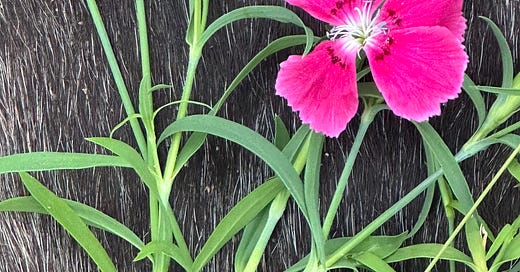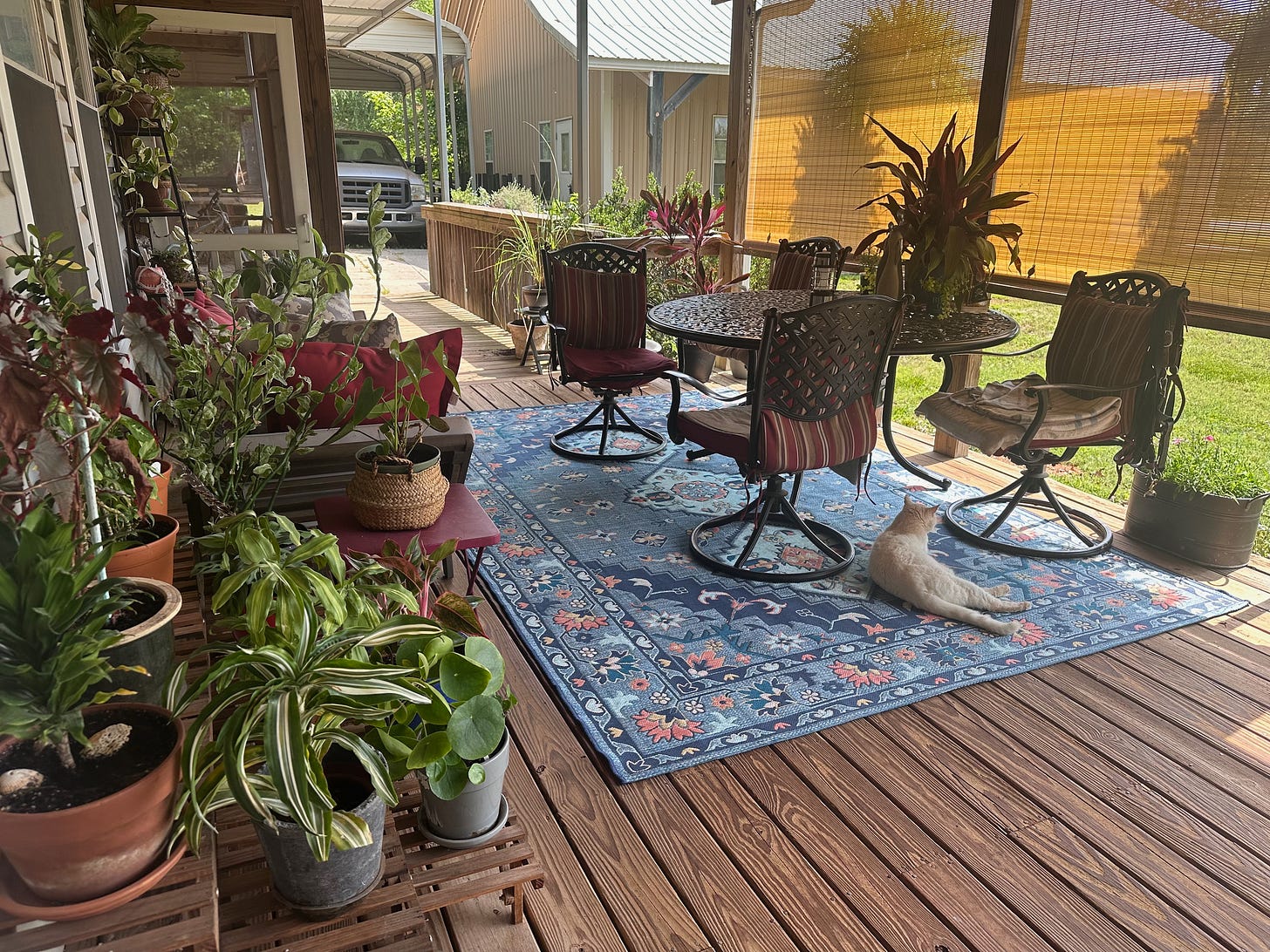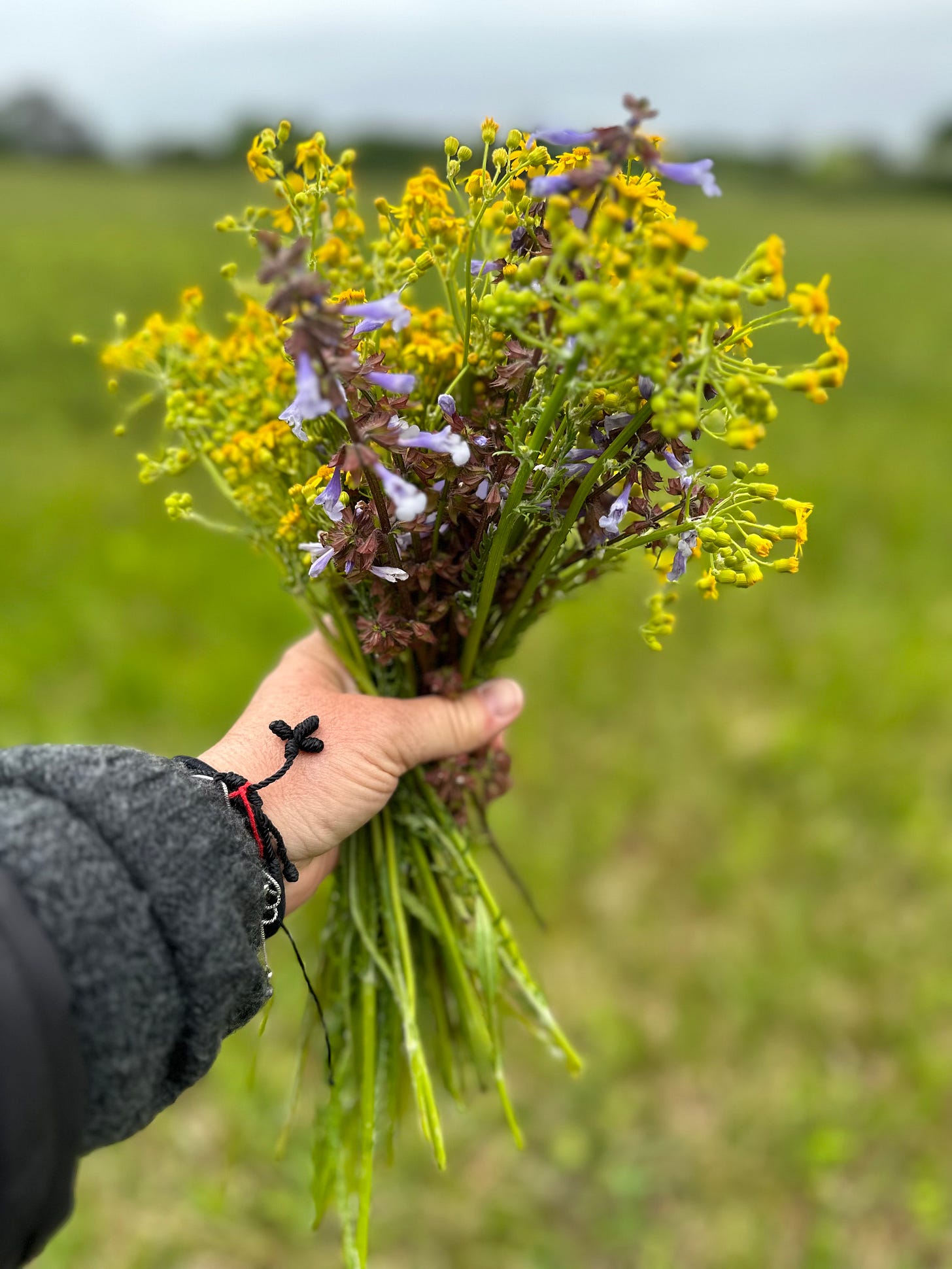I’m going to be telling stories for weeks/months/years about the ways people have shown up to honor the passing of my school horse, Choo. But today I want to tell you about planting seeds, physically and metaphorically, and how whole visions spring out of tiny ideas.
A few days after Choo’s passing, my grief hit the anger mark — the point where when anyone asked, “How are you doing?” I’d say, “I’ve reached the mad-at-God phase, but he’s cool with it and we’re having some good dialogue.”
On that day I was grumpy and ill-tempered. It was a Sunday. After I faux-raged at any innocent question anyone asked me, Becky Hammer handed me a small brown paper bag.
Becky is more than a student, apprentice, and staff member at the farm. Becky is brilliant and intuitive. She’s an incredible human being and we’re honored to have her here with us in all the ways she shows up — because she’s always showing up.
I didn’t open the bag right away because I was too busy corning everyone into hearing my raging thoughts. My skin felt hot and my body felt tired and loss had taken all the sense I’d given the world. I was re-living my high school journal days of existential angst — those years when I’d discovered Nietzsche and Dostoevsky and everything was pointless and dark and I was the smartass who knew the truth.
(I probably should go ahead and burn those journals.)
Everything felt meaningless.
Eventually, like a horse balancing out after a spook, I sat on the table in the front hallway of the barn and stared at the ring and driveway. My physical awareness came back online as my thoughts quietened. My fingers started to feel out the texture of the bag I was holding. I peered inside it.
There was a beautiful note along with packets and packets of wildflowers — a library of seeds, including Sweet William in honor of Billy who passed two months to the day, on the full moon, before Choo.
The packets contained wildflowers to cover their graves.
“Thank you,” I whispered to Becky.
Thank you.
The world wasn’t a pointless and dark place after all.
I didn’t plant the seeds right away. I placed the bag reverently on the table beside the front door in the farmhouse. I looked at it as I walked in and out.
Both Billy and Choo’s graves are in the grass field beside the house, but I hadn’t visited either one of them once they were placed in the ground.
When the evening weather consistently reaches 50 degrees all the houseplants begin to migrate to the porches. I wrote a piece in 2021, Salvation by Houseplants, that detailed how I went from identifying as a sucky gardener to reluctantly believing that I could keep a ficus supplied with water, light, and nutrients.
One plant turned into one hundred as I made weekly trips to the big box stores to rescue and restore all the sad little plants that the world had given up on in the clearance section.
The farm is located in a temperate, mountainous region with defined seasons. Most houseplants are tropical (me in a backyard in Hawaii — LOOK! That plant is like the one in the bedroom!) So during our South Carolina winters, the inside of the farmhouse looks like a jungle. It’s almost too much, like I’m overrun with roommates — too many.
As spring stabilizes into warmer nights the plants are as happy as I am to get some space away from each other as they make their move to the porches.
Another thing I fell in love with in Hawaii was outdoor living spaces, lanais that are used and treated like another room in the house. The front porch of the farmhouse is barren in the winter. It gets a lot of use as a place where I meet coaching clients, but it doesn’t feel alive in the colder months.
Like taking the initiative to plant the wildflowers on top of Choo and Billy, I came up with excuses to postpone the annual house plant migration. It all seemed too hard and impossible. I couldn’t charge my body into action even though my entire being felt on fire with energy that had nowhere to go.
Christopher is my lightning rod who grounds me.
“Time to move the plants,” he said, with a pot of wilted, scraggly brown leaves in his hands.
“Let’s do it tomorrow.”
“We could do it right now?”
Christopher was all bright and airy as I solemnly shuffled after him with pots.
“Maybe the porch needs some shades to keep the sun from blinding clients in early morning sessions,” I said.
“And a new rug.”
“A rug would be nice.”
“We could move the raised beds from the field and bring them closer to the house. It would be easier to water.”
As the plants migrated, I found myself tending to them when I’d otherwise be sitting and brooding. I snipped and re-potted. I browsed the clearance section for rescue plants. As the porch began to bloom, I bloomed.
“The energy feels different from the parking lot.”
I meticulously sowed a litany of garden seeds into little peat pods to jump-start seedlings for the deer to eat in the new, hypothetical, raised beds closer to the house. I numbered the dividers in the domed, tabletop greenhouse and listed the descriptions carefully in my journal: 1. Red Russian Kale . . . 24. White Lisbon Onion.
Etc.
On the way to the hose faucet beside the house, Christopher handed me a five-leaf clover.
The ferns I overwintered on the unused hearth were a failed project. I typed, “3 Boston Ferns,” into the grocery list on my phone.
“We should sprout some mung beans,” I said.
As I peeled a mango that was grown in some faraway land, I thought about the effort it took to get the fruit into my hands.
I’d never tried to grow fruit trees.
Christopher is a structural genius. Surely he could design and build a greenhouse.
Like the compost mountain beside the barn, my grief slowly transformed into a meadow with the help of a grounding rod and dozens of asymmetrical pots of rescue plants.
I run my fingers through the top of a plump bag of grass seed like Amélie in the 2001 French movie dipping her fingers into a bag of lentils. The uniform compactness of the seeds, the loose togetherness of them, feels soothing like a weighted blanket.
Christopher hands me a scoop and I measure out the fescue grass into a bucket that’s scarred with dried cement and drops of tar, the residue of barn maintenance.
I carry the bucket and Becky’s brown bag. Christopher carries a metal rake.
The temperature shifts as we approach the oak-rich forest at the edge of the big field, like cool air caught in a stone chapel.
“Do we cover Billy or Choo first?”
“Billy,” Christopher says. “Because he was first.”
As I study the bare, packed mound of red clay that covers Billy I’m in awe of the size of the hole. I think about an article I read about a man in search of whales and how overcome with grief he was when he visited an area where a pod of adolescent bull whales had beached themselves. The enormity of their unmoving physical size compounded the realness of their passing.
The hugeness of the whale’s past presence and future non-presence was solidified by the immense tactile square footage of their graveyard.
I feel the same looking at the bare ground where these horses are laid.
Becky selected Sweet William in honor of Billy. I open the packets carefully and scatter the seeds in the center of the mound. I ring the edges with a fat packet of assorted wildflowers. As I dip my hand into the grass seed to cover everything all up, the wind catches the seed and helps distribute it all like an intuitive and willing partner. Like the way the wind always is when I’m not working against it.
I refill the bucket of seeds before walking across the field to Choo.
The dirt is looser over the top of him. The seeds leave my hands like a veil, like a memorial shroud carved in rugged stone, so delicate it seems impossible. So much of the art that stays with us through the centuries is in memory of a place, of a person, of an animal, as we’re busy setting our memory in rock when it’s as tenuous as the breeze.
Like what I’m doing with words here.
Because the facts don’t matter as much as the essence. The facts are swayed by perception. To me, Choo was a chimera that huffed his breath into my ear. To others, he was a professor.
Like the oak trees that have risen up from the collapsed hole where we placed Matilda a few years ago, I think about the nutrients drawn from the roots and how regeneration is all around me, no matter how much I want to ignore the signs and seasons.
Choo’s garden will continue to grow.
Choo’s Memorial Scholarship Fund
And Choo’s garden is growing tangibly and intangibly through the effort of everyone who loved him. In less than a week, the idea for a memorial fund that woke me up in the middle of the night has grown staggeringly into vital funds that will allow us to gift our services to people who need them most.
We do a lot of things at Bramblewood Stables:
Mindset Coaching — to help teens and adults move past barriers in their lives by accessing their agency and learning to trust their guts. My coaching sessions combine current science with age-old wisdom that empowers clients to know themselves better. And by knowing themselves they are better able to create and manifest future goals that reflect their core values and individual curiosity.
Respite Sessions — a chance for individuals and families to spend an hour re-wilding in nature with the horses. From horsemanship basics to classical in-hand work alongside equine biomechanics and human nervous system attunement, these unmounted sessions are a chance to slow down, regroup, and breathe.
Traditional Riding Lessons — Bramblewood began as a traditional riding school for kids and adults and we’re still teaching throughout the week and weekends. The difference these days is that our students are given solid riding basics that address partnership with — and the physical longevity of — the horse. Because the horse is the whole reason we’re doing this thing.
Apprentice Program — a long-term commitment of mentor-crafted learning that includes client, interpersonal, and husbandry skills for current and future equine professionals. This is where the future of the horse industry is shaped.
Workshops, Camps, Clinics, and Community Partnerships — every month Bramblewood is hosting opportunities for people to learn more about themselves and/or horses. In a nature-deficient society, we follow the horse’s lead in learning to be observant participants in our lives and in our communities and in the natural world. Whatever the event, re-wilding is the purpose.
Choo’s Memorial Scholarship Fund allows us to provide these services to people who otherwise could not afford them. And in a lot of ways, these people are the ones who need the horses most. A donation of any size helps us spread our mission far and wide.
And then there is me, writing about what we do, but mostly using these pages to write — to write. Because before I was a barn owner and a teacher and a coach, I was/am a writer. And nothing makes me happier than sharing words with you that could potentially urge you to put your own together into a sentence.
That’s what I’m doing every month in my Journaling Workshops, both online and in person. All those words swirling in your head need a home and it is my deepest pleasure to help you find it.
All my workshops are introvert-friendly because I have never met a writer who likes to be put on the spot, forced to speak, or generally fussed over to do anything when they’re writing.
Last night, the raccoons dug through the raised beds and un-planted a rosemary bush in a pot with their little fingers. The deer are creeping steadily closer to the lettuces. Afternoon storms are watering the seeds that I cast over the grave sites. Bouquets of flowers and soulful art still accumulate in front of the door of Choo’s stall. Someone contacted me about a potential new horse heading our way from Florida.
And when I check my email I’m always wondering — who is coming next? What new stories will merge with the stories that form the backbone of this farm?
Perhaps the greatest work I’ve accomplished to date was creating a space where people are free to share their stories. We need that. The world needs that. The horses are simply the catalyst that inspires us to connect.
Until next week —
Love, Kim








This is so beautiful Kim- I feel like I need to read it a few more times to soak in the beauty of your words. I'm so glad you have a Becky and a Christopher to help you through. That the wind helped you sow more beauty in the place of sadness. Thank you xx
The porch looks fabulous! 😍 we could call it the Lanai ☺️ thank you for sharing these beautiful words. 💜